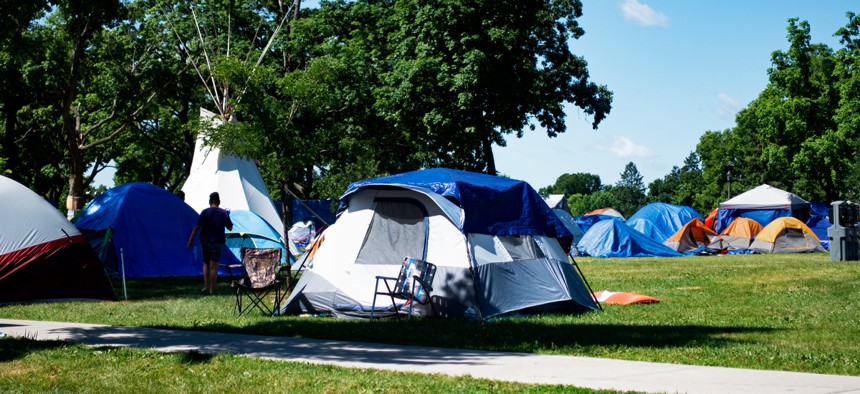Cities Sued for Sweeping Homeless Encampments During the Pandemic

An encampment in Minneapolis' Powderhorn Park grew to 300 people this summer. Shutterstock
Advocacy groups filed lawsuits against Minneapolis and Denver this month over clear outs of homeless encampments, saying the enforcement during a pandemic is cruel and counterproductive.
People who were evicted during homeless encampment sweeps in Minneapolis sued the city last week, arguing that removing them from local parks violated their constitutional rights and caused them to lose thousands of dollars worth of property, including tents, medication, and personal documents.
Patrick Berry, one of the plaintiffs in the suit who lost his tent, mattress, and sleeping bag, said that the enforcement of anti-encampment policies during the pandemic was unnecessary. “People are already suffering so much,” he said in a statement. “It is really cruel what the city is doing.”
The lawsuit, filed by the ACLU of Minnesota and Mid-Minnesota Legal Aid, is the second this month against city sweeping practices. Earlier in October, an advocacy group for unsheltered people sued the city of Denver, similarly alleging that sweeping encampments is unconstitutional.
Advocates in both cities allege that encampment residents were not given enough notice to gather their belongings and move on before camps were swept. Minneapolis officials said they gave 72 hours notice before sweeps, but residents of camps said they only found out 24 hours beforehand. As the result of a 2019 settlement, Denver agreed to give residents a week’s notice before sweeps would take place unless public health and safety were threatened, which the city said is the case during the pandemic.
Residents of the encampment disagree. “The purpose and effect of these sweeps is to send the message to homeless individuals that they are not welcome in public space,” the Denver lawsuit reads.
For months, advocates for unsheltered people have condemned cities that are sweeping encampments despite discouragement from the Centers for Disease Control and Prevention. The organization’s guidance for local governments says that “clearing encampments can cause people to disperse throughout the community and break connections with service providers, [increasing] the potential for infectious disease spread.”
Cities and counties say that they need to clear the encampments to dispose of trash and used syringes, as well as deal with rat infestations and other public health hazards. In response to the lawsuits, both Denver and Minneapolis have said that unsheltered people aren’t safe sleeping outside, especially as cold weather arrives, and that they have been trying to direct people toward shelters and social services.
In Minnesota, the lawsuit names the city of Minneapolis, Hennepin County, the local police department, and Minneapolis Parks and Recreation Board as defendants. The advocacy groups are seeking a temporary restraining order on evictions of homeless people from tents or other temporary shelters established in parks and other public spaces. The enforcement actions listed in the suit happened this summer, when city officials swept encampments in city parks, one of which had grown to nearly 300 people.
Several of the plaintiffs in the class action lawsuit only became homeless after coronavirus and the ensuing recession hit the area. Justin Perl, litigation director of Mid-Minnesota Legal Aid, said in a statement that the local government should be working on other solutions to help those who are struggling right now. “Simply removing people from public view is not the solution,” he said. “The city and county's bulldozer approach is not only cruel, it is shortsighted, counterproductive, and a waste of taxpayers' dollars.”
Since the pandemic began, Hennepin County County has moved more than 1,400 people who were homeless to emergency shelters and hotels. Public health experts had warned early on in the Covid crisis that leaving people unhoused or keeping them in cramped quarters would facilitate the spread of the virus among medically vulnerable populations.
The county is also set to spend an additional $22 million from federal coronavirus funds on six new sites, including shuttered hotels, that could expand the area’s shelter capacity.
In mid-October, there were an estimated 222 tents remaining in 14 parks. In September, the city said that all encampments would be removed by the end of October, with the park board supervisor noting that “the need to transfer people into shelter spaces is becoming critical.”
The Minneapolis Park and Recreation Board said that it has been “humane, lawful, and measured in its responses to temporary encampments in the parks.” In a statement, the board said that allegations brought by the ACLU and other advocacy groups are “simply not true.” Encampments were removed “due to size; documented crime, health, and safety incidents; or location in a school safety zone.” The board said staff conducted outreach with unsheltered people living in the park to connect them with shelters.
“The MPRB has consistently acknowledged that parks do not provide dignified shelter,” the board said. “The MPRB has worked the last five months with state, county, city, and social service organizations to find safe shelter and for people experiencing homelessness in park encampments before cold weather settles in and to reduce the number of temporary encampments from over 40 to 10 today.”
In Denver, the City Attorney’s Office responded to the suit by saying that “the city works very hard to connect people experiencing homelessness with services, but cannot allow unsafe and unsanitary conditions to continue as it puts everyone at risk, including those who are experiencing homelessness.”
Emma Coleman is the assistant editor for Route Fifty.
NEXT STORY: Breonna Taylor Killing Spurs Action Against No-Knock Warrants






